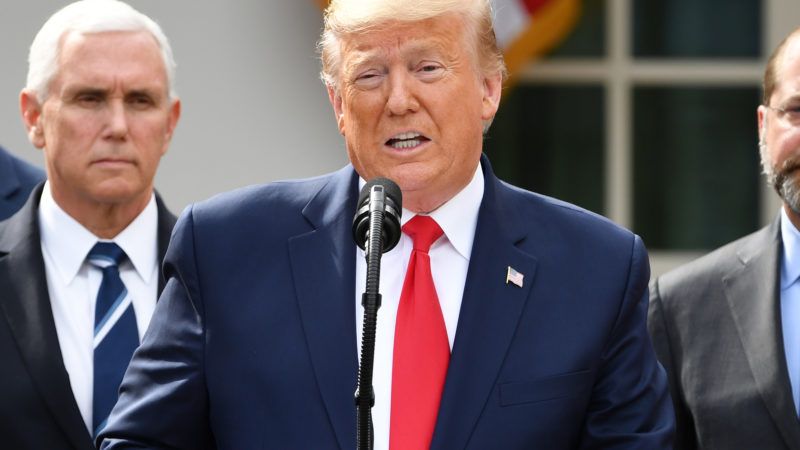Trump Declares National Emergency To 'Unleash the Full Power of the Federal Government'
But what he will do with that power remains uncertain.

"To unleash the full power of the federal government in this effort today, I am officially declaring a national emergency," President Donald Trump announced on Friday afternoon. "Two very big words."
The president assured listeners that the country "will overcome the threat of the virus" and will be "even stronger" for it. But his briefing comes amid criticisms from conservatives and liberals alike that he has not done enough to address COVID-19, particularly as the stock market continues to toss and turn. The president's delayed response to coronavirus—which included passing over meetings on the subject, propagating false statistics, and downplaying its severity—may have contributed to its proliferation in the United States.
Trump nonetheless struck a boastful note in his remarks. "When you compare what we've done with other areas of the world, it's pretty incredible," he said Friday. "A lot of that had to do with the early designation and the closing of the borders. And, as you know, Europe was just designated as the hotspot right now, and we closed that border a while ago. Whether that was lucky or through talent or through luck, call it whatever you want."
The national emergency declaration would allow the deployment of up to $35 billion in aid. (Or perhaps $50 billion, which was the figure the president quoted in his remarks.) Per the Stafford Act, the president can disburse Federal Emergency Management Agency (FEMA) support to states and localities as they wrestle with containing the pandemic. In addition to suspending the entry of foreign nationals who have been to Europe over the last two weeks, the president also asked hospitals to activate their emergency preparation plans and is allowing the Secretary of Health of Human Services to waive several regulations around medical treatment and hospital stays.
Trump announced a public-private partnership to increase coronavirus testing in the United States. That's a good idea, but until now Food and Drug Administration (FDA) regulations have hamstrung private labs' ability to provide tests to those in need. That shortage could have been successfully ameliorated with the help of private sector players more than a month ago.
The Roche test, for instance, is 10 times faster at screening for the virus, but it was not approved by the FDA until today. Scott Gottlieb, a resident fellow at the American Enterprise Institute and former FDA chief, noted the success of the method on Twitter, calling it a "fairly routine technology" as far back as February 2.
Denunciations of Trump's approach crescendoed after his national address on Wednesday evening, when the president overstated European travel restrictions, accidentally said that there would be a trade ban (there won't be), and erroneously claimed that coronavirus treatment would be free.
Indeed, Trump on multiple occasions has downgraded the coronavirus to nothing more than seasonal influenza—an assertion that contradicts the scientific consensus. Anthony Fauci, director of the National Institute of Allergy and Infectious Diseases, testified that the fatality rate is likely to settle around 1 percent, which is 10 times that of the flu.
Reminders to quell panic are well-taken, though insufficient in the face of a deadly disease that experts say requires significant social distancing to protect the most vulnerable. In that vein, Trump sought to strike a different tone as he delivered his final remarks, emphasizing the seriousness of the matter.
"All Americans have a role to play in defeating this virus," he said. "Our most effective weapon right now is to limit the damage to our people and our country, and slow the spread of the virus itself. The choices we make, the precautions we put into place are critical to overcoming the virus."
